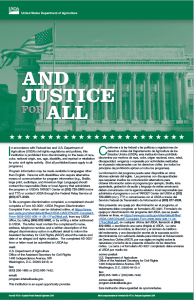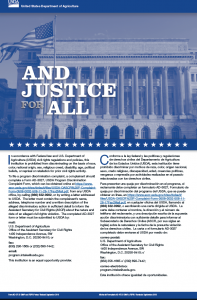What are Civil Rights?
Extension Policy on Unauthorized Immigrants

Civil rights are a class of rights which ensure one’s ability to participate in the civil and political life of the society and state without discrimination or repression guaranteeing equal protection under the law. Information in this section provides the background needed to learn more about the adoption of Civil Rights Acts throughout United States history. Civil rights are generally considered to be universal rights that apply to all persons. There have been a number of Civil Rights movements in US history, with the most recognized being the Civil Rights Movement of the 1960’s, addressing the violation of rights for black/ African American citizens. This movement led to the Civil Rights Act of 1964, prohibiting discrimination based on race, color, religion, sex and national origin by federal and state governments as well as some public places.
Policy

Extension, a division of the University of Wisconsin-Madison, part of the federal land-grant system and federal extension system, a partner with the National Institute of Food and Agriculture (NIFA) of USDA, and a recipient of NIFA funding and other federal funds, complies with federal civil rights, equal opportunity and nondiscrimination laws, related to USDA departmental rules and regulations.
The United States Department of Agriculture (USDA) prohibits discrimination in all its program and activities on the basis of race, color, national origin, age, disability, and where applicable, sex, marital status, familial status, parental status, religion, sexual orientation, genetic information, political beliefs, reprisal, or because all or part of an individual’s income is derived from any public assistance program.
In accordance with United States Department of Agriculture Civil Rights regulations 7 CFR 15 which effectuates Title VI of the Civil Rights Act of 1964, any recipient of federal financial assistance, regardless of the amount, is subject to civil rights reviews.


In Extension, compliance with civil rights laws in the area of educational programs assures that every customer and colleague is treated with fairness, equality, and respect and that we are inclusive and have adequate diversity. Our primary goal in Extension is to create societal value through research-based education that is relevant to the needs of our stakeholders and embraces and surpasses USDA civil rights expectations by identifying gaps and opportunities to develop and improve educational programming to all citizens of the state.
The “And Justice For All” poster, in the specific 11″x17″ size, is the primary method for informing customers of our nondiscrimination policy statement and how to file a civil rights complaint with the USDA. The poster is in English and Spanish and comes in two versions: the green version (AD-475A) and the blue version (AD-475B). The green poster should be placed in locations where general Extension programming is being conducted, where it can be viewed by employees and customers. The blue poster is for used for FoodWIse programs. Copies of the poster can be requested from the Office of Access, Inclusion, and Compliance. Posters in languages other than English and Spanish can be found here.
Learn More:
The content in this section serves as background information for the learning and understanding of Civil Rights laws, terminology and policies that are a basis for the roles and expectations of colleagues for compliance assurance.
Civil Rights Policy
- Partner nondiscrimination letter template (download document)
- And Justice For All poster (11″x17″ size): To be displayed in office and locations where programming is being conducted.
Copies available from the Office of Access, Inclusion, and Compliance. - Guidance on use of “And Justice For All” poster
- NIFA’s Office of Equal Opportunity and Civil Rights
- FoodWIse – Food and Nutrition Service’s Civil Rights Division